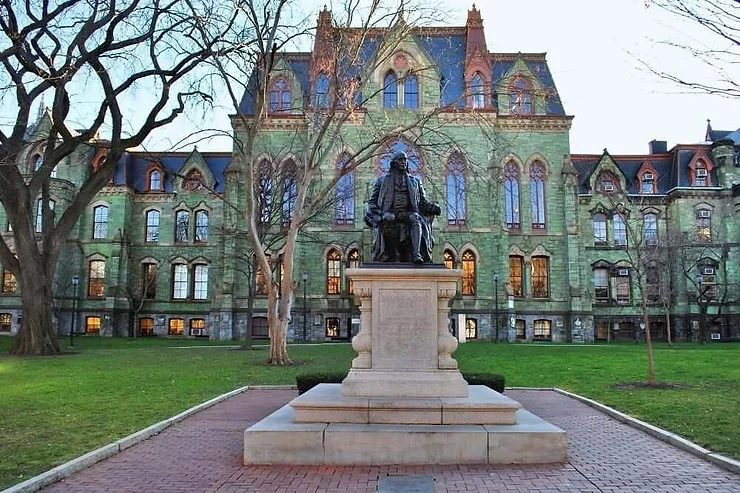Adrianne is a college admissions consultant and TV/film director, producer, writer, and actress currently based in LA. She uses her experience in multiple disciplines to help students achieve their personal and academic goals.
Working on your UPenn application? Here’s how to write the supplemental essays you need to complete in addition to your Common Application.

Welcome to the Penn supplemental essays for the 2021-2022 application cycle! Unlike many other Ivy League schools, Penn doesn’t ask you a zillion questions. In fact, they only ask you two (unless you’re applying to a more specific program or school), and they’re both pretty standard. There’s a “Why This College?” essay and a “Community” question. You may have written one or two of these already, but Penn has its own way of phrasing these questions, which means you can’t just recycle the essays you’ve written for other schools. You’ve got to write a Penn-specific essay. Here’s how.
Considering the specific undergraduate school you have selected, how will you explore your academic and intellectual interests at The University of Pennsylvania? For students applying to the coordinated dual-degree and specialized programs, please answer these questions in regard to your single-degree school choice; your interest in the coordinated dual-degree or specialized program may be addressed through the program-specific essay. (300-450 words)
This is a pretty typical “Why This College?” essay. Penn wants to see that you’ve done your research and have a truly compelling reason for wanting to attend Penn and not just any top university. As always, though, these essays should ultimately be about you.
Penn makes this abundantly clear at the beginning of the prompt: “How will you explore your academic and intellectual interests at The University of Pennsylvania?” You want to give Penn a sense of what you’ll do once you’re on campus, and why Penn is the right place for you, but you need to ground all this in what you’ve already done. Penn wants you to tell an origin story. They want to see where your intellectual passion comes from and why it’s personal. Show them how you’ve pursued your intellectual and academic interests in impactful and meaningful ways.
Penn wants to know what you’re going to do once you’re on campus, but they won’t be convinced unless you can ground your claims in your past experiences. Think about it: anyone can say they’re going to conduct high-level research, found a profitable biotech company, and become the president of three different clubs as a UPenn undergraduate. Not everybody can give convincing examples of what they have already done that suggest that these future projects are realistic.
It’s a little bit like new tactics in conducting professional interviews. Employers used to ask potential employees about where they saw themselves in five or ten years, how they would handle theoretical problems, and so on. And then everyone realized that the best predictor of future success is past experience and achievement. So employers started asking job candidates: “How have you solved a challenging problem?” rather than “How will or would you deal with situation X?” Admissions officers, like potential employers, are more impressed by concrete, quantifiable accomplishments than by unsubstantiated promises about the future.
This essay needs to include, as always when writing “Why This College?” essays: what you’re going to major in, two or three professors you’re interested in working with, some Penn-specific classes you want to take. Save the student clubs and organizations you’d be interested in joining for the second question Penn asks.
Maybe you don’t know what you want to major in. That’s fine — you’re not signing a contract here. But you’re going to have a very difficult time writing this essay if you don’t have a direction. When choosing a (fictitious) major, go with what makes the most sense. Go with whatever subject fits most logically with your experiences and achievements to date. Once again, previous success is the most convincing way to back up your future goals.
Finding a couple of professors means spending some time on the website of the department you’d like to work most closely with. Again, the professors you mention should teach in the field you have experience in.
When I say you need to mention Penn-specific classes, I mean you need to select upper-level classes (again, in a subject you’ve stood out in) that you can’t find at just any school. A weak response reads like this: “I hope to major in anthropology. This would allow me to work closely with [insert name of Visiting Assistant Professor who only teaches giant lecture classes to first-year students]. I look forward to taking ANTH 001 and 002 along with everybody and their mother.” Try to find classes and instructors in line with your interests. The idea is to show that Penn will allow you to build on all the great things you’ve already accomplished.
Finally, just because this is a relatively long response does not mean that you should waste any words. Just as with a 150-word piece, don’t bother praising the beautiful urban campus or the world-class faculty. Lots of colleges have nice city campuses, and plenty have world-class faculties.
At Penn, learning and growth happen outside of the classroom, too. How will you explore the community at Penn? Consider how this community will help shape your perspective and identity, and how your identity and perspective will help shape this community. (150-200 words)
First of all, remember that the word “community” can mean just about anything you want it to — your community is for you to define. Maybe you’re looking forward to joining a cultural group at Penn, or maybe you’re excited about joining an intellectual community through participation in a student group. You can find a list of student organizations at Penn here.
When it comes to clubs, once again, make sure you’re reinforcing your narrative — something that fits with what you’ve already done. Not all the clubs you mention have to be directly related to your major, but they shouldn’t cause admissions officers to raise their eyebrows. They should be related to interests you’ve already pursued in meaningful and demonstrable ways.
Writing about your past experiences is also how you answer the second part of this question: “…how this community will help shape your perspective and identity, and how your identity and perspective will help shape this community.” No general statements or platitudes here. Discuss how your past experiences have helped shape your identity and perspective, how you’ve done the same for the community or communities you’ve belonged to, and show us the foundation that will support your work at Penn outside of the classroom.
As always, our Ivy League admission consultants are here to help. Don’t hesitate to reach out.



